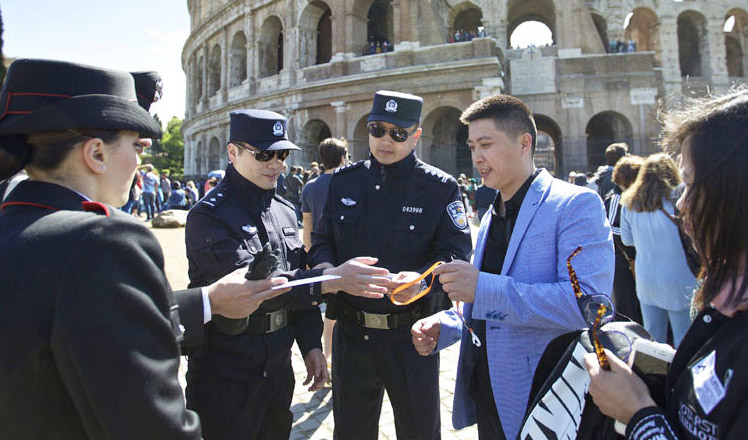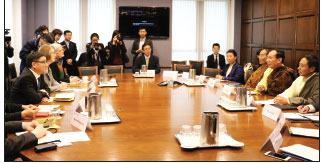Tibet delegation meets Pelosi on Hill
Updated: 2016-04-29 11:26
By Cai Chunying in Washington(China Daily USA)
|
||||||||
|
Qizhala (second from right), deputy of China's National People's Congress and secretary of CPC Lhasa Municipal Committee, talks to American scholars including (from left) Cheng Li, director of Thornton China Center at Brookings Institution, Susan Lawrence of the Congressional Research Service and Jamie Horseley, executive director of the China Law Center at Yale University, at Brookings Institution in Washington on Thursday. Duojicaiwang (third from right) is vice-chairman of Committee of Financial and Economic Aff airs of Tibet People’s Congress, and Jiangbai (right), director-general of Tibet's Poverty Alleviation Offi ce. Cai Chunying / China Daily |
A delegation of government leaders from China's Tibet autonomous region told US congressional leaders and China experts that Tibet welcomes exchanges and stands ready to deepen the understanding between China and the United States.
The delegation, led by Qizhala, secretary of CPC Lhasa Municipal Committee and deputy of China's National People's Congress, met with US House Minority Leader Nancy Pelosi on Capitol Hill on Thursday.
Pelosi visited Tibet last November, along with six other Democrat lawmakers, before going to Beijing to meet with the head of China's top legislature, the National People's Congress.
Qizhala praised Pelosi's efforts to understand China and enhance US-China relations and called for more communication, exchange and practical cooperation between the two countries.
Pelosi described her previous visit to Tibet as an impressive trip that helped her group's understanding of the region and built a bridge between the two countries, saying the US will adhere to the One China principle and acknowledge Tibet as part of China's territory, according to people attending the meeting.
Qizhala also expressed hopes that the US will keep its promise of respecting China's sovereignty and territorial integrity and not support activities aimed at separating China, including a visit by the Dalai Lama.
The delegation was received earlier by Cheng Li, director of the Thornton China Center at the Brookings Institution, along with other scholars, including Susan Lawrence, specialist in Asian affairs at the Congressional Research Service, Jamie Horseley, executive director of the China Law Center at Yale University, and Katharine Moon, senior fellow of Brookings' Center for East Asia Policy Studies.
"We are grateful to have the opportunity to exchange our views with government officials, academia and the public whom we have met during our trip in the US. The discussion has been candid, comprehensive and productive," said Qizhala, whose delegation also included Duojicaiwang, vice-chairman of the financial and economic affairs committee of the Tibet People's Congress, and Jiangbai, director-general of Tibet's poverty alleviation office.
"We are all indigenous Tibetans, born and raised in Tibet. Our delegation members all have worked in key social sectors including economic development, environmental protection, and women's rights. We therefore have a rather comprehensive view of Tibet," Qizhala said.
Li said Brookings welcomed the opportunity to exchange views directly with leaders and people from the Tibet autonomous region.
According to Li, it has been a tradition for Brookings to receive similar delegations from Tibet since 2013.
Qizhala used five words to describe the land of Tibet: ancient, high-altitude, pure, sacred and new, among which he stressed "new" because the "new developments in Tibet have yet to be widely known to the outside world".
charlenecai@chinadailyusa.com
- UN urges DPRK to stop 'further provocative action'
- China stresses Putin's expected visit
- British FM visits Cuba for 1st time since 1959
- Trump attacks Clinton on gender, risking backlash from women
- Pirate radio poses surprising challenge in internet age
- DPRK's Musudan missile launch appears to have failed

 Female patrol team seen at West Lake in Hangzhou
Female patrol team seen at West Lake in Hangzhou
 Drones monitoring traffic during May Day holiday
Drones monitoring traffic during May Day holiday
 Sino-Italian police patrols launched in Italy
Sino-Italian police patrols launched in Italy
 Met Gala: Fashion in an Age of Technology
Met Gala: Fashion in an Age of Technology
 Photos from around China in April
Photos from around China in April
 Top 10 luxury cars at the 14th Beijing auto show
Top 10 luxury cars at the 14th Beijing auto show
 European castle-style campus wows in Southwest China
European castle-style campus wows in Southwest China
 Industrial city reinvents itself as green oasis
Industrial city reinvents itself as green oasis
Most Viewed
Editor's Picks

|

|

|

|

|

|
Today's Top News
Liang avoids jail in shooting death
China's finance minister addresses ratings downgrade
Duke alumni visit Chinese Embassy
Marriott unlikely to top Anbang offer for Starwood: Observers
Chinese biopharma debuts on Nasdaq
What ends Jeb Bush's White House hopes
Investigation for Nicolas's campaign
Will US-ASEAN meeting be good for region?
US Weekly

|

|









